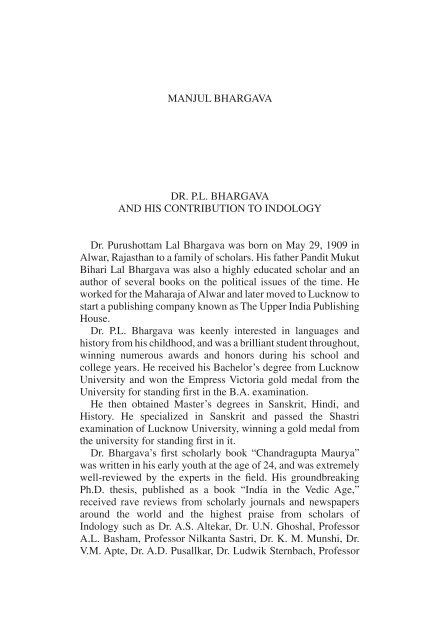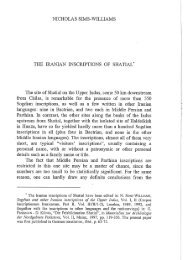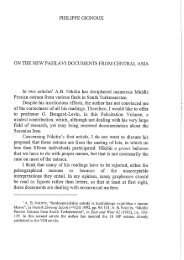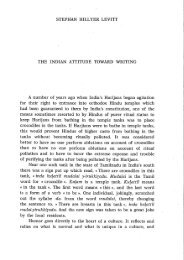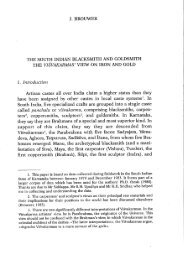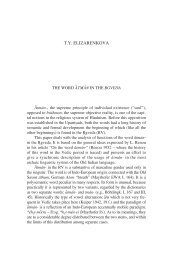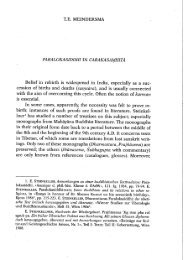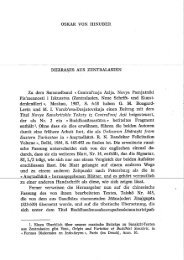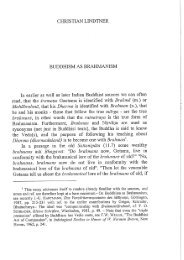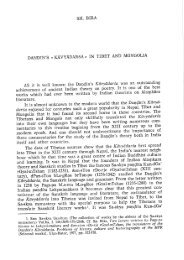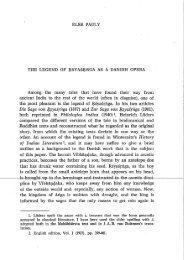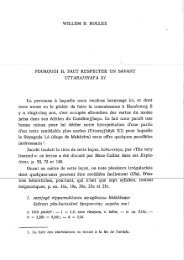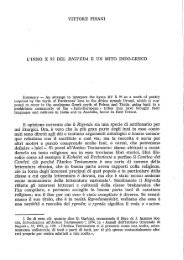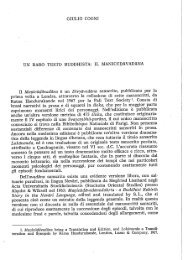Dr. PL Bhargava and his contribution to Indology - Indologica.com ...
Dr. PL Bhargava and his contribution to Indology - Indologica.com ...
Dr. PL Bhargava and his contribution to Indology - Indologica.com ...
You also want an ePaper? Increase the reach of your titles
YUMPU automatically turns print PDFs into web optimized ePapers that Google loves.
MANJUL BhArGAVA<br />
<strong>Dr</strong>. P.L. BhArGAVA<br />
AND hIS CONTrIBUTION TO INDOLOGy<br />
<strong>Dr</strong>. Purushottam Lal <strong>Bhargava</strong> was born on May 29, 1909 in<br />
Alwar, rajasthan <strong>to</strong> a family of scholars. <strong>his</strong> father P<strong>and</strong>it Mukut<br />
Bihari Lal <strong>Bhargava</strong> was also a highly educated scholar <strong>and</strong> an<br />
author of several books on the political issues of the time. he<br />
worked for the Maharaja of Alwar <strong>and</strong> later moved <strong>to</strong> Lucknow <strong>to</strong><br />
start a publishing <strong>com</strong>pany known as The Upper India Publishing<br />
house.<br />
<strong>Dr</strong>. P.L. <strong>Bhargava</strong> was keenly interested in languages <strong>and</strong><br />
<strong>his</strong><strong>to</strong>ry from <strong>his</strong> childhood, <strong>and</strong> was a brilliant student throughout,<br />
winning numerous awards <strong>and</strong> honors during <strong>his</strong> school <strong>and</strong><br />
college years. he received <strong>his</strong> Bachelor’s degree from Lucknow<br />
University <strong>and</strong> won the Empress Vic<strong>to</strong>ria gold medal from the<br />
University for st<strong>and</strong>ing first in the B.A. examination.<br />
he then obtained Master’s degrees in Sanskrit, hindi, <strong>and</strong><br />
<strong>his</strong><strong>to</strong>ry. he specialized in Sanskrit <strong>and</strong> passed the Shastri<br />
examination of Lucknow University, winning a gold medal from<br />
the university for st<strong>and</strong>ing first in it.<br />
<strong>Dr</strong>. <strong>Bhargava</strong>’s first scholarly book “Ch<strong>and</strong>ragupta Maurya”<br />
was written in <strong>his</strong> early youth at the age of 24, <strong>and</strong> was extremely<br />
well-reviewed by the experts in the field. <strong>his</strong> groundbreaking<br />
Ph.D. thesis, published as a book “India in the Vedic Age,”<br />
received rave reviews from scholarly journals <strong>and</strong> newspapers<br />
around the world <strong>and</strong> the highest praise from scholars of<br />
<strong>Indology</strong> such as <strong>Dr</strong>. A.S. Altekar, <strong>Dr</strong>. U.N. Ghoshal, Professor<br />
A.L. Basham, Professor Nilkanta Sastri, <strong>Dr</strong>. k. M. Munshi, <strong>Dr</strong>.<br />
V.M. Apte, <strong>Dr</strong>. A.D. Pusallkar, <strong>Dr</strong>. Ludwik Sternbach, Professor
22 <strong>Indologica</strong> taurinensia, 36 (2010)<br />
Oscar Bot<strong>to</strong>, <strong>and</strong> Professor T. Burrow.<br />
From there began a very prolific career, in which <strong>Dr</strong>. <strong>Bhargava</strong><br />
continued <strong>his</strong> remarkable scholarly work in Ancient Indian<br />
<strong>his</strong><strong>to</strong>ry <strong>and</strong> Sanskrit. <strong>his</strong> specialty was reconstructing <strong>his</strong><strong>to</strong>ry,<br />
<strong>and</strong> separating <strong>his</strong><strong>to</strong>ry from myth, by corroborating various<br />
literary <strong>and</strong> <strong>his</strong><strong>to</strong>rical sources along with archeological evidences.<br />
In addition <strong>to</strong> over 100 research articles, <strong>Dr</strong>. <strong>Bhargava</strong> also<br />
published several other highly reviewed scholarly books, including<br />
“retrieval of <strong>his</strong><strong>to</strong>ry from Puranic Myths”, “Pracheen Bharat ka<br />
Itihaas” (hindi), <strong>and</strong> “Vedic religion <strong>and</strong> Culture”. he continued<br />
writing influential books <strong>and</strong> articles even in <strong>his</strong> nineties, <strong>and</strong> all<br />
<strong>his</strong> books have been received with great enthusiasm, admiration<br />
<strong>and</strong> high en<strong>com</strong>iums by scholars in the field.<br />
<strong>Dr</strong>. <strong>Bhargava</strong> was a plenary speaker at countless national <strong>and</strong><br />
international conferences in Asia, Europe, <strong>and</strong> North America.<br />
Even at age ninety he was remarkably active professionally; for<br />
example, he travelled <strong>to</strong> Torino, Italy, with <strong>his</strong> gr<strong>and</strong>son Manjul<br />
<strong>Bhargava</strong> in 2000 when he was invited <strong>to</strong> the 11th world Sanskrit<br />
conference by the Direc<strong>to</strong>r of CESMEO, <strong>Dr</strong>. Oscar Bot<strong>to</strong> (a very<br />
close friend <strong>and</strong> colleague of <strong>his</strong> for over 40 years), <strong>to</strong> deliver a<br />
lecture <strong>and</strong> chair two sessions on Vedic Literature.<br />
Aside from scholarship, <strong>Dr</strong>. <strong>Bhargava</strong> also did much for<br />
education - particularly language education - in India. <strong>Dr</strong>.<br />
<strong>Bhargava</strong> was the very first <strong>and</strong> longest reigning head of<br />
the Sanskrit Department at rajasthan University. he laid the<br />
foundation of the Sanskrit Department of rajasthan University<br />
in 1961, <strong>and</strong> with <strong>his</strong> vision, hard work <strong>and</strong> brilliant initiatives<br />
it quickly became one of the best known departments on campus<br />
<strong>and</strong> among the leading Sanskrit departments in the country. with<br />
<strong>Dr</strong>. <strong>Bhargava</strong>’s efforts, the newly formed Sanskrit Department<br />
at rajasthan University rapidly became known not only outside<br />
Jaipur but also abroad, <strong>and</strong> attracted several foreign students<br />
who came <strong>to</strong> study Sanskrit with <strong>Dr</strong>. <strong>Bhargava</strong>; many of them<br />
are now well-established scholars/dignitaries in their own right,<br />
such as Professor Johannes Bronkhorst of the University of<br />
Lausanne, Switzerl<strong>and</strong>, Ambassador hinkus Nijenhuis, the Dutch<br />
Ambassador <strong>to</strong> Venezuela, <strong>and</strong> Professor Liudmila khokhlova of<br />
the Institute of Asian <strong>and</strong> African Studies, Moscow. <strong>Dr</strong>. <strong>Bhargava</strong>’s
Manjul <strong>Bhargava</strong>, <strong>Dr</strong>. P.L. <strong>Bhargava</strong> <strong>and</strong> <strong>his</strong> <strong>contribution</strong> <strong>to</strong> <strong>Indology</strong><br />
P.L. <strong>Bhargava</strong> with Oscar Bot<strong>to</strong> <strong>and</strong> some of the speakers <strong>and</strong> guests of the 11th<br />
World sanskrit conference (Villa Gualino, turin, 2000)<br />
numerous students who did research under <strong>his</strong> guidance have gone<br />
on <strong>to</strong> do excellent work as teachers <strong>and</strong> researchers at various<br />
institutions of higher learning, <strong>and</strong> some have followed in <strong>his</strong><br />
footsteps by later heading the Sanskrit Department at rajasthan<br />
University, like <strong>Dr</strong>. hari ram Acharya, Prof. Basant Jaitley <strong>and</strong><br />
<strong>Dr</strong>. Subhash Taneja.<br />
<strong>Dr</strong>. <strong>Bhargava</strong> remained as head of the Sanskrit Department at<br />
rajasthan University for an extended period of 12 years (1961-<br />
73), before which he was the head of the Sanskrit Department of<br />
the newly created rajasthan College, Jaipur, for several years. he<br />
was also a Visiting Professor at Punjabi University, Patiala for a<br />
year <strong>and</strong> a Visiting Professor of religion at McMaster University<br />
in Canada where he taught for two years.<br />
<strong>Dr</strong>. <strong>Bhargava</strong> contributed <strong>to</strong> the advancement of rajasthan<br />
University in many capacities, scholarly as well as administrative.<br />
he started the prestigious scholarly publication “rajasthan<br />
University Studies in Sanskrit” <strong>and</strong> served as its Edi<strong>to</strong>r. he also<br />
23
24 <strong>Indologica</strong> taurinensia, 36 (2010)<br />
served as the Dean of the Faculty of Sanskrit Studies <strong>and</strong> as the<br />
Direc<strong>to</strong>r of the School of humanities <strong>and</strong> continued <strong>to</strong> introduce<br />
new ideas <strong>and</strong> make constant improvements in the curriculum.<br />
Another admirable initiative <strong>Dr</strong>. <strong>Bhargava</strong> <strong>to</strong>ok as Professor<br />
<strong>and</strong> head of the Sanskrit Department at rajasthan University,<br />
<strong>and</strong> prior <strong>to</strong> that at rajasthan College, was <strong>to</strong> popularize Sanskrit<br />
by staging plays in Sanskrit. he directed many Sanskrit plays<br />
depicting interesting scenarios from various famous plays such<br />
as Shakuntalam, Mrcchakatikam, <strong>and</strong> Swapna Vasavadattam. he<br />
wrote the script in easy-<strong>to</strong>-underst<strong>and</strong> Sanskrit <strong>and</strong> spent enormous<br />
amounts of time training the students <strong>to</strong> enact their roles properly<br />
<strong>and</strong> pronounce Sanskrit dialogues correctly <strong>and</strong> clearly.<br />
Among <strong>his</strong> recruits for ac<strong>to</strong>rs in <strong>his</strong> plays was Govardhan<br />
Asrani, who played the part of “Vidushak” in the scenes from<br />
Mrcchhakatikam <strong>and</strong> who then went on <strong>to</strong> be<strong>com</strong>e a famous<br />
<strong>com</strong>edian in Indian feature films. Several years later, Asrani met<br />
with <strong>Dr</strong>. <strong>Bhargava</strong> <strong>and</strong> expressed <strong>his</strong> heartfelt gratitude <strong>to</strong>wards<br />
him for initiating him in<strong>to</strong> acting through the Sanskrit plays.<br />
The part of Udayana in one of <strong>his</strong> plays, depicting a scene from<br />
Swapna Vasavadattam, was played by one of <strong>his</strong> brilliant foreign<br />
students Johannes Bronkhorst, who (as already mentioned) is<br />
now a well-known Indologist. Prof. <strong>Bhargava</strong>’s Sanskrit plays in<br />
Jaipur were widely attended <strong>and</strong> highly appreciated <strong>and</strong> enjoyed<br />
by even the layman audience, who walked away with a happy<br />
feeling of having learnt many conversational Sanskrit phrases<br />
while being entertained by the wonderful student ac<strong>to</strong>rs.<br />
Professor <strong>Bhargava</strong> was also a very popular <strong>and</strong> frequent<br />
speaker at All India radio, Jaipur where he gave many talks for<br />
the benefit <strong>and</strong> education of the general public on various <strong>to</strong>pics<br />
of interest from Sanskrit literature.<br />
<strong>Dr</strong>. <strong>Bhargava</strong> has had the rare distinction of being a profound<br />
scholar of both Sanskrit <strong>and</strong> <strong>his</strong><strong>to</strong>ry. he had equal <strong>com</strong>m<strong>and</strong> on<br />
the three languages of Sanskrit, hindi <strong>and</strong> English <strong>and</strong> wrote <strong>and</strong><br />
lectured extensively in all three. But he had an interest in all world<br />
languages. For example, in 1970, he <strong>to</strong>ok up learning Italian so<br />
that he could correspond in Italian with <strong>his</strong> good friend of many<br />
years, Professor Oscar Bot<strong>to</strong>, the former President of CESMEO.<br />
Today, due <strong>to</strong> <strong>his</strong> numerous <strong>and</strong> remarkable scholarly
Manjul <strong>Bhargava</strong>, <strong>Dr</strong>. P.L. <strong>Bhargava</strong> <strong>and</strong> <strong>his</strong> <strong>contribution</strong> <strong>to</strong> <strong>Indology</strong><br />
<strong>contribution</strong>s, <strong>Dr</strong>. <strong>Bhargava</strong> is highly regarded by the scholarly<br />
<strong>com</strong>munity of Sanskrit <strong>and</strong> Indic Studies as one of the leading<br />
scholars of our times. Among <strong>his</strong> more recent honors include the<br />
title of “Vidyamahodadhi” awarded by the rashtriya Ved Vidya<br />
Pratishthan <strong>and</strong> Vedic Sanskriti Pracharak Sangh. In 1995, he<br />
was honored at the rashtrapati Bhavan by the President of India<br />
as one of the great Sanskrit scholars of our time.<br />
Despite <strong>his</strong> immense achievements, <strong>Dr</strong>. <strong>Bhargava</strong> remained<br />
always an extremely humble, gentle, generous, <strong>and</strong> kind person, a<br />
true rshi in every sense of the word, who has truly set an example<br />
for future generations <strong>to</strong> follow. he passed away in 2002, leaving<br />
behind Çrimati Shanti <strong>Bhargava</strong>, <strong>his</strong> wife for 68 years, <strong>his</strong> three<br />
children Mira, Shobhana, <strong>and</strong> Divakar, <strong>and</strong> five gr<strong>and</strong>children.<br />
For <strong>his</strong> extraordinary ac<strong>com</strong>plishments, including <strong>his</strong><br />
involvement in the life of rajasthan University, <strong>his</strong> unique<br />
<strong>contribution</strong>s <strong>to</strong> the advancement <strong>and</strong> rise of the Sanskrit<br />
Department <strong>and</strong> rajasthan University, <strong>his</strong> outst<strong>and</strong>ing <strong>and</strong> deep<br />
work as a research scholar, <strong>his</strong> devotion <strong>and</strong> <strong>com</strong>mitment <strong>to</strong><br />
teaching <strong>and</strong> <strong>his</strong> love for <strong>his</strong> students, <strong>his</strong> relentless <strong>and</strong> innovative<br />
attempts <strong>to</strong> popularize Sanskrit among the masses <strong>and</strong> <strong>his</strong> deeply<br />
inspiring legacy, rajasthan University is happy <strong>to</strong> have made t<strong>his</strong><br />
humble attempt <strong>to</strong> express its gratitude <strong>to</strong> him by bringing world<br />
scholars <strong>to</strong>gether at a conference in December 2009 marking <strong>his</strong><br />
birth centenary.<br />
selected bibliography of research articles<br />
1. “Glimpses of the Vedic Age”, An Extension Lecture at herbert<br />
College, kotah, February 9, 1952, Published by the University<br />
of rajputana, Jaipur.<br />
2. “kalidas ki kavita”, the University of rajasthan studies (arts<br />
section), Vol. VII, 1961-62.<br />
3. “Fresh Light on the Battle of Ten kings”, the University of<br />
rajasthan studies (sanskrit <strong>and</strong> Hindi), July 1967.<br />
4. “The Date of kalidasa”, the University of rajasthan studies<br />
(sanskrit <strong>and</strong> Hindi), 1967-68.<br />
25
26 <strong>Indologica</strong> taurinensia, 36 (2010)<br />
5. “The Original home of the Aryans <strong>and</strong> Indo-Iranian<br />
Migrations”, annals of the Bh<strong>and</strong>arkar Oriental research<br />
Institute, Golden Jubilee Volume, Vol. 48-49, Pune, 1968, pp.<br />
219-226.<br />
6. “The deities of the rgveda”, rtam, Akhil Bhartiya Sanskrit<br />
Parishad, VIII, 29, 10, 1969.<br />
7. “<strong>his</strong><strong>to</strong>rical Importance of the Danastutis of the rgveda”,<br />
Journal of the Ganganatha Jha Kendriya sanskrit Vidyapeetha,<br />
Prayag, Vol. 29, Parts 1-4, 1973.<br />
8. “Vedanta <strong>and</strong> world Thought”, the rajasthan University<br />
studies in sanskrit <strong>and</strong> Hindi, No. 6, 1973-74.<br />
9. “The Natyasastra of Bharata”, charu Deva shastri Felicitation<br />
Volume, 1974.<br />
10. “The Original home of the Iksvakus”, Journal of the royal<br />
asiatic society of Great Britain <strong>and</strong> Irel<strong>and</strong>, London, Vol. 1,<br />
1976, pp. 64-66.<br />
11. “Additions <strong>and</strong> Interpolations in the Bhagavadgita”, East <strong>and</strong><br />
West, rome, Vol. 27, Nos. 1-4, December 1977, pp. 357-361.<br />
12. “The Origin <strong>and</strong> Development of Puranas <strong>and</strong> their relation<br />
with Vedic Literature”, annals of Bh<strong>and</strong>arkar Oriental<br />
research Institute, Pune, Vol. 58-59, 1977-78, pp. 489-498.<br />
13. “Indian riddles: A Forgotten Chapter in the <strong>his</strong><strong>to</strong>ry of<br />
Sanskrit Literature”, the Journal of the royal asiatic society<br />
of Great Britain, 1978.<br />
14. “Problem of Ancient Indian Chronology”, Puratattva:<br />
Bulletin of the Indian archaeological society, Varanasi, Vol.<br />
10, 1978-1979, pp. 118-122.<br />
15. “Ayodhya in Early Vedic Literature”, annals of the<br />
Bh<strong>and</strong>arkar Oriental research Institute, Pune, Vol. 60, Nos.<br />
1-4, 1979.<br />
16. “The Comparative Antiquity of Indra <strong>and</strong> Varuna”, Ludwik<br />
sternbach Felicitation Volume, Akhil Bharatiya Sanskrit<br />
Parishad, Berlin, 1979.<br />
17. “My reminiscences of Professor Sternbach”, Ludwik<br />
sternbach Felicitation Volume, Akhil Bhartiya Sanskrit<br />
Parishad, 1979.<br />
18. “Names <strong>and</strong> Epithets of krishna in the Bhagavadgita”,<br />
<strong>Indologica</strong> taurinensia, Volume 7 (1979), Torino, 1980, pp.
Manjul <strong>Bhargava</strong>, <strong>Dr</strong>. P.L. <strong>Bhargava</strong> <strong>and</strong> <strong>his</strong> <strong>contribution</strong> <strong>to</strong> <strong>Indology</strong><br />
93-96.<br />
19. “The Adityas in the rgveda”, Vishveshwaran<strong>and</strong> <strong>Indologica</strong>l<br />
Journal, hoshiarpur, Vol. 18, Parts 1-2, 1980, pp. 15-81.<br />
20. review of the book “Dates <strong>and</strong> Dynasties in Earliest India”<br />
by r. Mor<strong>to</strong>n Smith, University of Toron<strong>to</strong>, Motilal Banarsidas,<br />
1973, annals of the Bh<strong>and</strong>arkar Oriental research Institute,<br />
Vol. 61, Pune, India, 1980.<br />
21. “rajasthan: The Cradle of Indo-Aryan Civilization (A Study<br />
Based on Early Literary Sources), Cultural Con<strong>to</strong>urs of India”,<br />
<strong>Dr</strong>. satya Prakash Felicitation Volume, 1981.<br />
22. “king Bhagiratha <strong>and</strong> the river Ganga”, Purana, Varanasi,<br />
Vol. 23, No. 1, Jan. 1981, pp. 3-8.<br />
23. “A Fresh Appraisal of the <strong>his</strong><strong>to</strong>ricity of Indian Epics”, annals<br />
of the Bh<strong>and</strong>arkar Oriental research Institute, Pune, Vol. 63,<br />
Nos. 1-4, 1982, pp. 15-28.<br />
24. “Names, Order <strong>and</strong> Chronology of Pre-Mauryan kings<br />
according <strong>to</strong> the Puranas”, recent studies in sanskrit <strong>and</strong><br />
<strong>Indology</strong>, Professor Jagannath Agrawal Felicitation Volume,<br />
Delhi, 1982, pp. 161-170.<br />
25. “The Enigmatic hymn of Visvedevas in the rgveda”,<br />
Baburam saxena Felicitation Volume, rtam, Akhil Bharatiya<br />
Sanskrit Parishad, 1983.<br />
26. “The word asura in the rgveda”, annals of the Bh<strong>and</strong>arkar<br />
Oriental research Institute, Pune, Vol. 64, Nos. 1-4, 1983, pp.<br />
119-128.<br />
27. “religion, God <strong>and</strong> homo Sapiens”, assembly of the World’s<br />
religions, November 15-21, McAfee, NJ, USA, 1985.<br />
28. “Origin of the Idea of Omnipresence of God in Aryan<br />
religious Thought”, the Journal of religious studies, Punjabi<br />
University, Patiala, Vol. XIII, 1985.<br />
29. “The Self-Introducing rsis of the rgveda <strong>and</strong> the Chronology<br />
of its hymns”, annals of the Bh<strong>and</strong>arkar Oriental research<br />
Institute, Pune, Vol. 66, 1985, pp. 13-30.<br />
30. “An Unnoticed Puranic Evidence for the Date of the Bharata<br />
war”, annals of the Bh<strong>and</strong>arkar Oriental research Institute,<br />
Pune, Vol. 68, 1987, pp. 559-561.<br />
31. “The hindu View of Monotheism”, the sixteenth International<br />
conference on the Unity of the sciences, Atlanta, GA, USA,<br />
27
28 <strong>Indologica</strong> taurinensia, 36 (2010)<br />
November 26-29, 1987.<br />
32. “yaska <strong>and</strong> Panini, Bharati”, Bulletin of the college of<br />
<strong>Indology</strong>, Banaras hindu University, 1987-88.<br />
33. “Position <strong>and</strong> Status of women in India in the Early Vedic<br />
Age”, seminar Papers, Department of ancient Indian His<strong>to</strong>ry,<br />
culture <strong>and</strong> archeology, Banaras hindu University, Varanasi,<br />
1988.<br />
34. “On the <strong>his</strong><strong>to</strong>ricity of rama”, sri Venkateswara University<br />
Oriental Journal Golden Jubilee Volume, Vol. 32-34, 1989-91.<br />
35. “The Episode of Balin in the ramayana”, annals of the<br />
Bh<strong>and</strong>arkar Oriental research Institute, amritamahotsava<br />
Volume, Pune, Vols. 72-73, 1991-92, pp. 497-499.<br />
36. “Arrangement <strong>and</strong> Compilation of the rgveda”, annals of the<br />
Bh<strong>and</strong>arkar Oriental research Institute, Pune, Vol. 75, Nos.<br />
1-4, 1994-95, pp. 243-245.<br />
Major Books<br />
- Fundamentals of Hinduism, Munshiram Manoharlal, Delhi, 1982.<br />
- Prachin Bharat ka Itihas, Second Edition, Munshiram Manoharlal,<br />
Delhi, 1992.<br />
- Vedic religion <strong>and</strong> culture, D.k. Printworld, New Delhi, 1994.<br />
- ch<strong>and</strong>ragupta Maurya, Second Edition, D.k. Printworld, 1996.<br />
- retrieval of His<strong>to</strong>ry from Puranic Myths, Second Edition, D.k.<br />
Printworld, 1998.<br />
- Founder of India’s civilization, Second Edition, Ajanta Books<br />
International, Delhi, 2000.<br />
- India in the Vedic age, Third Edition, D.k. Printworld, New<br />
Delhi, 2001.<br />
- Bhagavadgita as It Was, Publication Scheme, Jaipur, 2008.<br />
- sahitya Vimarsh, Second Edition, Publication Scheme, Jaipur, 2009.<br />
* * *
Manjul <strong>Bhargava</strong>, <strong>Dr</strong>. P.L. <strong>Bhargava</strong> <strong>and</strong> <strong>his</strong> <strong>contribution</strong> <strong>to</strong> <strong>Indology</strong><br />
On December 18 th -21 st 2009, at Jaipur, an International<br />
Conference in honor of the 100th Birth Anniversary of Professor<br />
P. L. <strong>Bhargava</strong> was organized by the Department of Sanskrit,<br />
University of rajasthan.<br />
The Conference, entitled “Sanskrit <strong>and</strong> the <strong>his</strong><strong>to</strong>ry of early<br />
India”, has been held at the Department of Sanskrit, University<br />
of rajasthan, Jaipur, <strong>to</strong> <strong>com</strong>memorate the Birth Centenary<br />
Celebrations of <strong>Dr</strong>. P. L. <strong>Bhargava</strong> who was the founder head of<br />
the Department of Sanskrit, University of rajasthan.<br />
It is because of <strong>his</strong> services <strong>and</strong> blessings that t<strong>his</strong> department<br />
has flourished <strong>and</strong> risen <strong>to</strong> fame as one of the principle centers of<br />
Sanskrit learning in India. <strong>his</strong><strong>to</strong>rically Jaipur, popularly known as<br />
the “Pink city”, is not only known for its <strong>to</strong>urist attraction but has<br />
also been a very old center of Sanskrit learning. Even in modern<br />
times it is remembered as the “other kashi” because of a galaxy<br />
of scholars that belonged <strong>to</strong> Jaipur. <strong>Dr</strong>. P. L. <strong>Bhargava</strong> was <strong>and</strong><br />
continues <strong>to</strong> be one of the shining stars of t<strong>his</strong> Galaxy <strong>and</strong> there<br />
can be no better way <strong>to</strong> remember him but <strong>to</strong> hold a conference<br />
in Jaipur <strong>to</strong> re-visit <strong>his</strong> <strong>contribution</strong> <strong>and</strong> <strong>to</strong> talk about the subjects<br />
that were very dear <strong>to</strong> him.<br />
29
30 <strong>Indologica</strong> taurinensia, 36 (2010)<br />
Governor Kamalaji lighting the lamp at the ceremony, while Vinod shastri,<br />
conference organizer, Furqan Qamar, Vice chancellor of rajasthan University, <strong>and</strong><br />
Johannes Bronkhorst, lecturer at the conference look on in background<br />
convener: <strong>Dr</strong>. Furqan Qamar - Vice chancellor, University of<br />
rajasthan.<br />
Organizers: Professor Laxmi sharma (Organizing secretary);<br />
Professor Bina agrawal; Professor Madan sharma; Professor<br />
rajesh Kumar Punia; Professor ram singh; Professor sunita<br />
sharma 1; Professor sunita sharma 2; Professor ch<strong>and</strong>ramani<br />
chauhan; Professor Jyotsna Vas<strong>his</strong>hth; Professor Mahipal<br />
Yadav; Professor Monica Jain; Professor Basant Jaitley;<br />
Professor Vinay Kumari sharma.<br />
International advisory Board; Professor Johannes Bronkhorst,<br />
University of Lausanne (chair); Professor Devarshi Kalanath<br />
shastri, Jagadguru raman<strong>and</strong>acharya sanskrit University;<br />
Professor Manjul <strong>Bhargava</strong>, Prince<strong>to</strong>n University.<br />
coordina<strong>to</strong>r: Professor Vinod shastri.
December 18 th<br />
Manjul <strong>Bhargava</strong>, <strong>Dr</strong>. P.L. <strong>Bhargava</strong> <strong>and</strong> <strong>his</strong> <strong>contribution</strong> <strong>to</strong> <strong>Indology</strong><br />
wel<strong>com</strong>e Dinner<br />
December 19 th<br />
Programme<br />
Inaugural Function: wel<strong>com</strong>e by <strong>Dr</strong>. Vinod Shastri;<br />
honouring of Special Guests; remarks by Shri Divakar<br />
<strong>Bhargava</strong>; Plenary Address by <strong>Dr</strong>. Vachaspati Upadhyaya,<br />
Vice-Chancellor, S.L.B.S. rashtriya Sanskrit Vidyapeeth,<br />
Delhi; remarks by <strong>Dr</strong>. Johannes Bronkhorst, University<br />
of Lausanne, Lausanne, Switzerl<strong>and</strong>; remarks by Shri<br />
Pratapsingh khatchariavas; remarks by honorable Vice-<br />
Chancellor <strong>Dr</strong>. Farhan Qamar; remarks by Chief Guest The<br />
honorable Governor kamala ji; Expression of Thanks by<br />
<strong>Dr</strong>. Lakshmi Sharma.<br />
Plenary Lecture: <strong>Dr</strong>. Devarshi kala Nath Shastry<br />
Plenary Lecture: <strong>Dr</strong>. Greg Bailey, La Trobe University,<br />
Bundoora, Australia: the Puranas as sources for His<strong>to</strong>ry,<br />
but what kind of <strong>his</strong><strong>to</strong>ry?<br />
Invited Lecture: <strong>Dr</strong>. Abhijit Ghosh, Jadavpur University,<br />
kolkata, India: rationale Behind the Parentages of the<br />
P<strong>and</strong>avas: Honouring the sequence of a Vedic tradition?<br />
Invited Lecture: <strong>Dr</strong>. Liudmila khokhlova, Institute of Asian<br />
<strong>and</strong> African Studies, Moscow, russia: traces of Indo-aryan<br />
on the terri<strong>to</strong>ry of Former soviet Union <strong>and</strong> russia<br />
Invited Lecture: <strong>Dr</strong>. hari ram Acharya, Former Professor,<br />
University of rajasthan<br />
December 20 th<br />
Plenary Lecture: <strong>Dr</strong>. Ashok Aklujkar, University of British<br />
Columbia,Vancouver, Canada: why asoka is older than he<br />
looks<br />
31
32 <strong>Indologica</strong> taurinensia, 36 (2010)<br />
Plenary Lecture: <strong>Dr</strong>. Johannes Bronkhorst, University of<br />
Lausanne, Lausanne, Switzerl<strong>and</strong>: c<strong>and</strong>ragupta Maurya<br />
<strong>and</strong> His Importance for Indian His<strong>to</strong>ry<br />
Plenary Lecture: <strong>Dr</strong>. Irma Piovano, Direc<strong>to</strong>r CESMEO,<br />
International Institute for Advanced Asian Studies,<br />
Torino, Italy: some Notes about the cårucaryåçataka of<br />
K‚emendra<br />
Invited Lecture: <strong>Dr</strong>. Madan Mohan Sharma, Professor,<br />
University of rajasthan<br />
Invited Lecture: <strong>Dr</strong>. Boris Zakharyin, Institute of Asian <strong>and</strong><br />
African Studies, Moscow, russia: soviet <strong>and</strong> russian<br />
His<strong>to</strong>rians on aryans’ Problem (a synopsis)<br />
Invited Lecture: <strong>Dr</strong>. Subhash Taneja, Former Professor,<br />
University of rajasthan: Kalhana ki rajtarangini<br />
December 21 st<br />
Plenary Lecture by <strong>Dr</strong>. Satyavrat Shastri, honorary Professor,<br />
Special Centre for Sanskrit Studies, Jawaharlal Nehru<br />
University, New Delhi<br />
Valedic<strong>to</strong>ry Function<br />
<strong>Dr</strong>. Vachaspati Upadhyaya paying respects <strong>to</strong> <strong>Dr</strong>. P.L. <strong>Bhargava</strong>
Manjul <strong>Bhargava</strong>, <strong>Dr</strong>. P.L. <strong>Bhargava</strong> <strong>and</strong> <strong>his</strong> <strong>contribution</strong> <strong>to</strong> <strong>Indology</strong><br />
P.L. <strong>Bhargava</strong>'s daughter Mira <strong>Bhargava</strong>.<br />
33
34 <strong>Indologica</strong> taurinensia, 36 (2010)<br />
Vinod shastri, conference organizer, speaking<br />
<strong>Dr</strong>. Vachaspati Upadhyaya speaking<br />
Johannes Bronkhorst speaking
Manjul <strong>Bhargava</strong>, <strong>Dr</strong>. P.L. <strong>Bhargava</strong> <strong>and</strong> <strong>his</strong> <strong>contribution</strong> <strong>to</strong> <strong>Indology</strong><br />
Furqan Qamar, Vice chancellor of rajasthan University, speaking<br />
Greg Bailey speaking<br />
35


